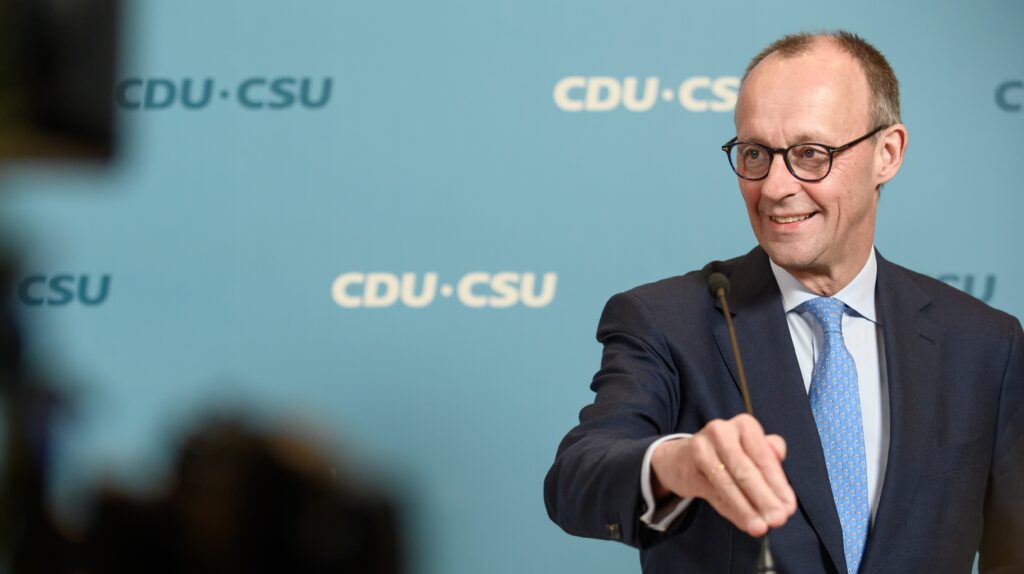Germany is preparing to relax its strict debt rules to increase defense and infrastructure spending. CDU leader Friedrich Merz has introduced a €500 billion special fund to boost military capabilities and improve public services. The plan, supported by CDU/CSU and SPD, aims to change the constitutional debt brake, which limits government deficits.
A Shift in Fiscal Policy
At a press conference in Berlin, Friedrich Merz stressed the urgent need for stronger defense due to growing global threats. “We must take a ‘whatever it takes’ approach to national security,” he said. SPD and CSU leaders stood with him, supporting a strategy to fund this increase through adjusted fiscal policies.
Germany’s debt brake, implemented in 2009, caps government deficits at 0.35% of GDP. The CDU/CSU had previously defended this rule, but rising security concerns and economic challenges have led to a policy shift. Merz now argues that Germany must reinforce its military while promoting economic growth through large-scale infrastructure investments.
Gaining Parliamentary Approval
For the plan to proceed, it must secure a two-thirds majority in parliament. This means CDU/CSU and SPD will need the support of the Greens. Merz hopes to reconvene the outgoing Bundestag to push the measure forward.
Though Merz did not campaign on changing debt restrictions, his party now says the global situation demands urgent action. The ongoing conflict between the United States and Ukraine, particularly tensions between U.S. President Donald Trump and Ukrainian President Volodymyr Zelenskyy, has increased security concerns across Europe.
“Germany and Europe need a strong defense,” Merz said. “CDU, CSU, and SPD will propose a constitutional amendment to allow defense spending exceeding 1% of GDP to bypass debt restrictions.”
Funding Beyond the Military
SPD leader Lars Klingbeil stressed that the funds would not only go to defense but also to education, childcare, and infrastructure. “This is about securing our future, not just militarily but also in schools, public services, and transport,” Klingbeil stated.
The investment package includes funds for modernizing roads, bridges, and energy networks. It also aims to support businesses through incentives for digital innovation and green energy projects.
Political Backlash and Debate
Not everyone supports the proposal. Green Party parliamentary leader Katharina Dröge criticized Merz for not consulting her party before announcing the plan. “Had he engaged in early talks, we might have found common ground to secure the necessary votes,” Dröge said.
Some also argue that Merz’s proposal contradicts his campaign promises. Robin Alexander, deputy editor-in-chief of WELT, noted: “This is a major policy shift. Defense spending will now bypass debt limits, and €500 billion is allocated for infrastructure. Ironically, this aligns more with Scholz and Habeck’s proposals than with Merz’s pledges.”
Markus Feldenkirchen of Der Spiegel echoed these concerns: “The CDU/CSU and SPD are taking a financially responsible approach, but this move contrasts sharply with what Merz promised voters. It looks more like a strategic shift than a campaign-backed policy.”
Economic and Social Impacts
The proposed changes could have wide-reaching effects. If successful, Germany could see stronger defense capabilities and improved public services. However, critics worry about rising debt levels. Economists remain divided, with some arguing that long-term growth will offset the initial borrowing, while others fear future tax increases.
Germany has historically prioritized fiscal discipline. Changing the debt brake would mark a significant departure from past policies. Whether this plan will gain enough support remains uncertain, but it is clear that Germany is at a turning point.
For the latest updates, visit New York Mirror.


